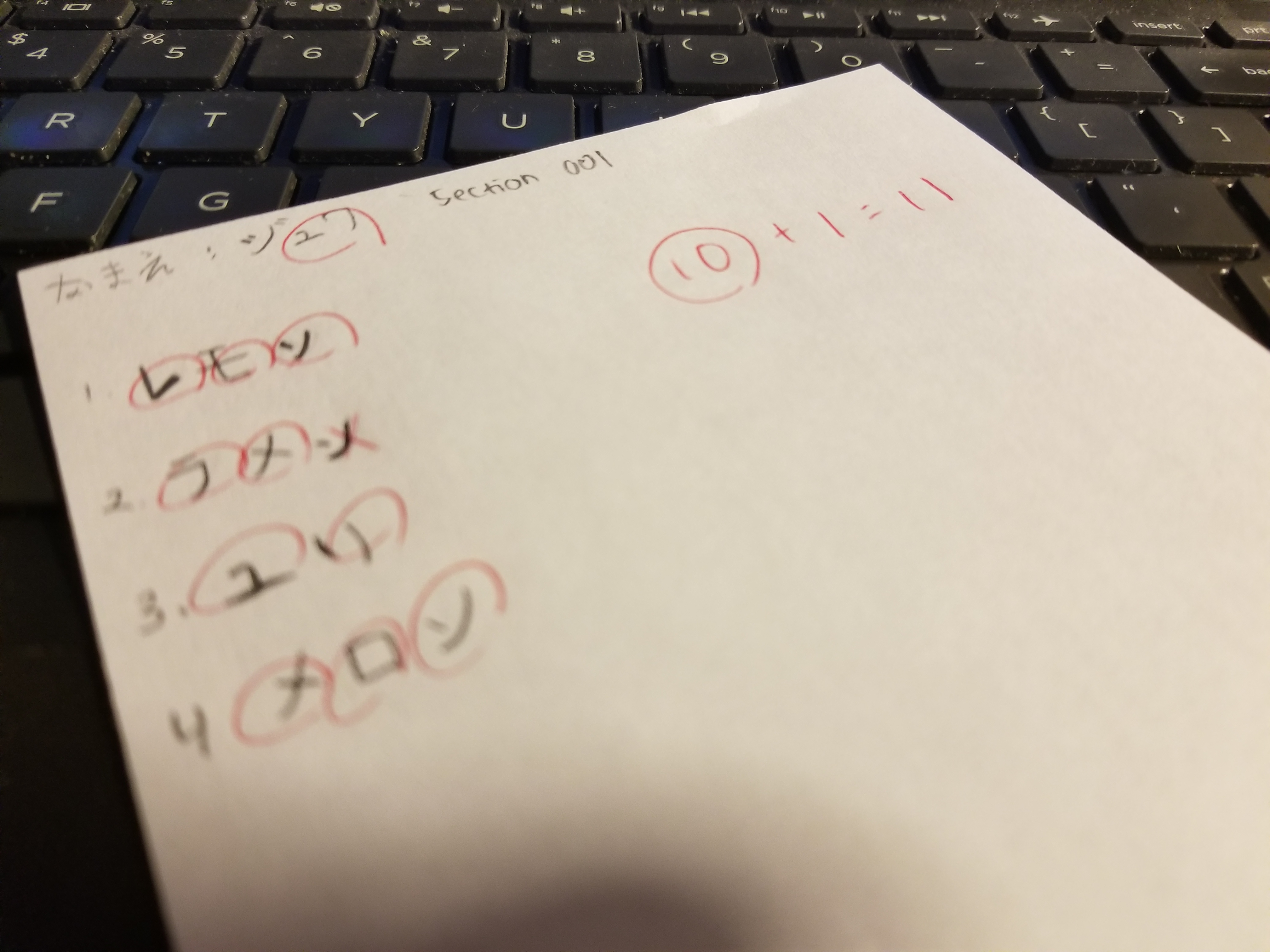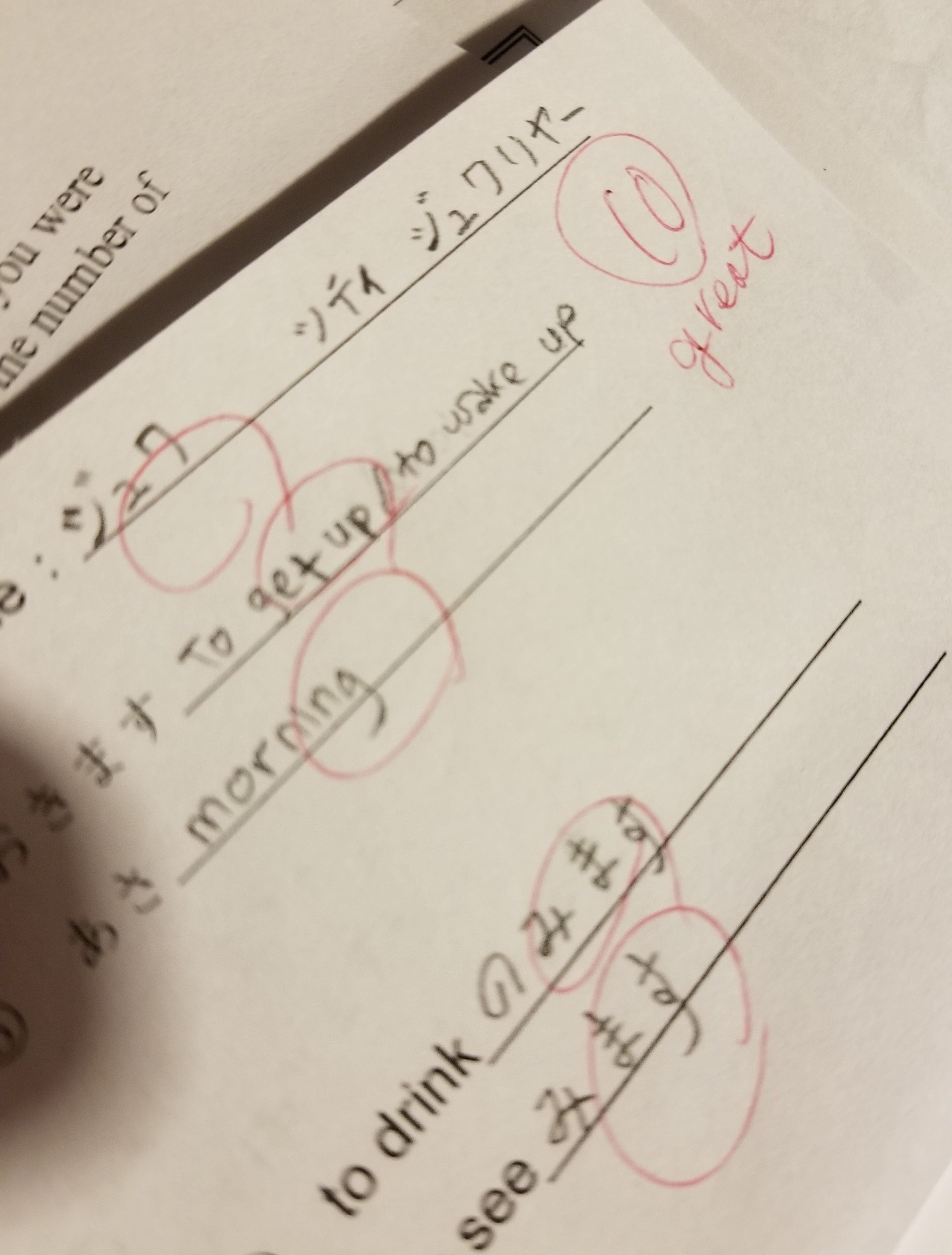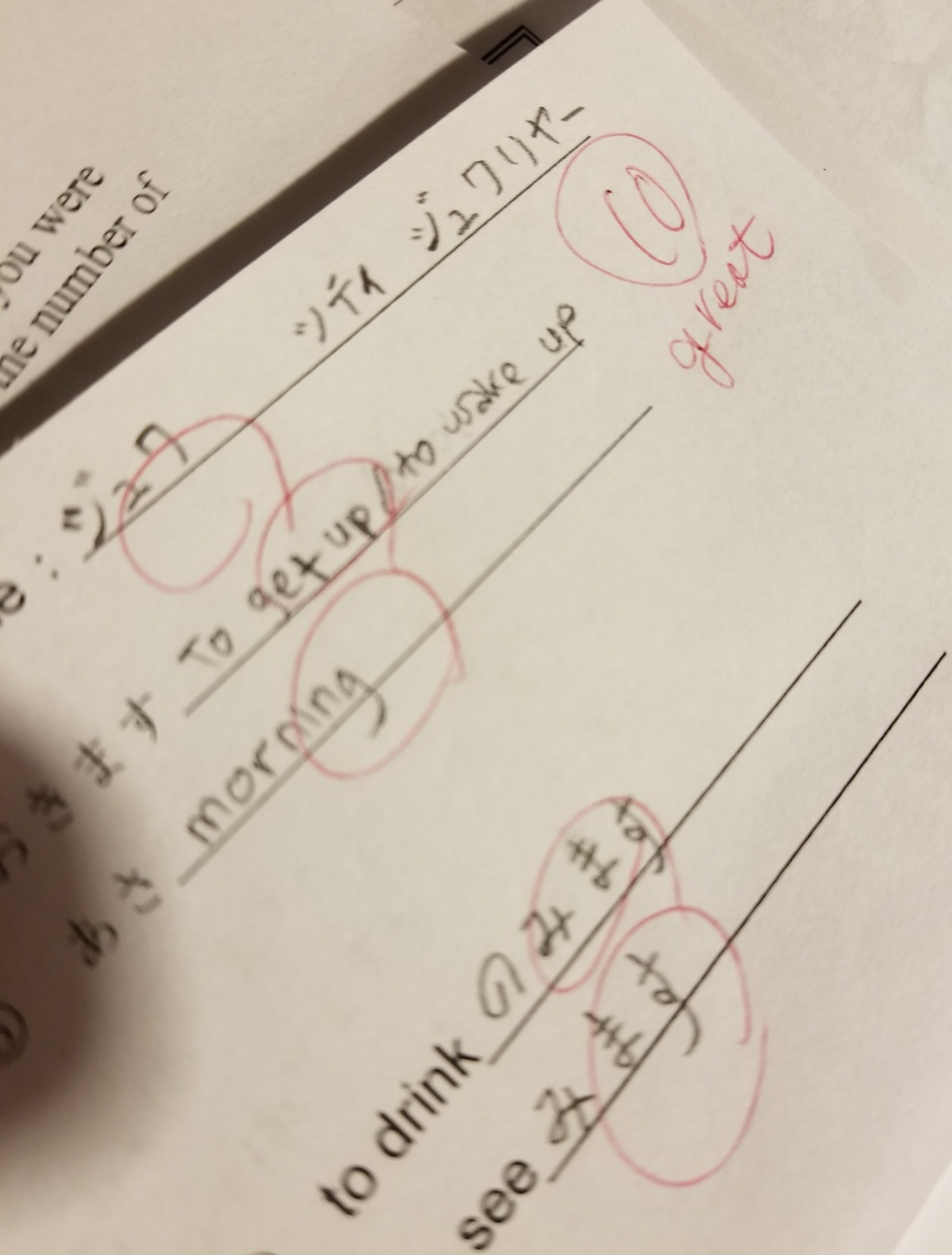A quick update: we have finished Chapter 2 about Katakana. Alas, I’m sure I won’t get 100 this time. That’s because there were some questions whose answers I didn’t know. As usual, we had listening part, vocabulary, structure, and reading. I’m okay with listening and vocabulary, especially because the teachers told us the list of words that might appear in the test and so I did study them. Structure is okay, too, except that there’s this question in which it’s in the form of a dialogue. I should make a question for the provided answer. Problem is a Q&A dialogue is between two different people, right? But in the test, it’s the same people, the same person asked the question and gave the answer. So I asked the teacher if there was a typo or such. Because if it’s the same person, then the first line/sentence can’t be in interrogative form but informative/positive. I don’t want to get it wrong because the two are different in Japanese. Luckily, the teacher said yes, it’s a typo. The second should be of a different person. And so I wrote the question, of which I’m sure I’m right. Lesson learned: if you’re a teacher, you should make your test clear; there might be an annoying (or super critical) student like me 🙈😅✌

The other day, I also have this situation with one of the other teachers. We were practicing to use “mo” (meaning also or too in Japanese), and we have to complete the dialogue. There is this part where someone asks, “Are you a college student?” then there is blank (in which we have to respond), and the next line is the person’s saying, “I’m also a college student.” So technically I should say, “Yes, I’m a college student.” to fit in the dialogue, right? But the teacher, acknowledging that I’m a graduate student, thought that I should answer “I’m a graduate student”. The two are different in Japanese. I was confused when the teacher said I should answer that way. First, I don’t make distinctions between college students and graduate students. For me, college is just the “place” of the study; it doesn’t distinguish the “level” of the study. I mean, I’m studying in the UofA, so technically I’m a college student, but yes, since I’m in the graduate program, then I’m a graduate student. But to me, a graduate student is also a college student though college students are not always graduate students. But the it dawns on me that in Japanese, the two can’t seem to “overlap”. So I make a note in my answer sheet that I should’ve said “graduate student” (daigakuinsei) and not just “college student” (daigakusei). But then I also realized: if I say “I’m a graduate student.” then the next line can’t be “I’m also a college student.” Thus, at the end of the class, I asked the teacher about this. I didn’t mean to be a smart-ass or such an annoying student, really. I asked because I was curious. I asked if it was okay to answer “I’m a graduate student” if the next line is “I’m also a college student.” Then the teacher smiled saying that I was right. She thought I was sharp and smart because I’m a graduate student studying second language acquisition 🙈😅 I think she likes me 😜😌 But, well, I’m happy if she likes me, but I don’t want to get special treatment either. I’m the same as everyone else, with the same responsibilities when it comes to Japanese 101. I also have my struggles in learning Japanese and I might need some help too with my learning. Thus, while I appreciate it that she thinks I’m smart (I’m sincerely happy for that!), but I don’t want her to overestimate me because that won’t be good for my learning – and possibly for others too 😊
And one part of the test asked us to write how to ask and tell about time in Japanese. There was a picture of a clock with the question. I could definitely write the question and how to answers using the correct words and structure. The problem is I don’t know how to say the numbers 🤦😅✌ I only know how to say numbers from 1 to 4. 5 and the rest, I don’t know 🙈😅 And the picture shows that the time is 9.30. So I left the “nine” part blank. I just wrote the number 😁 I didn’t know not because I forgot, though. I didn’t know because I simply didn’t study about it. I guess that’s from when I was skipping the class to go to LA. But the point is that: we need some kind of motivation to learn, study, remember, and memorize the words. I did quite fine with my vocabulary quizzes, because they gave me the list so I got to study and memorize them. When it’s not listed for the quiz, I might read it briefly, but because I have so many things to do, then I don’t feel the need to quickly or immediately memorize it. It’s like I’m taking my time (not because I’m lazy, ok?). But if it’s listed for the quiz, I feel the need to quickly memorize it. I make a copy so it’s easier to memorize and remember, etc. Hence, I think when we teach students and want them to remember, we should somehow give them an enough “reason” to do so. Something for their motivation. Well, I know my motivation is kinda wrong, memorizing them so I can get good scores for the quiz; but whatever it is, I benefit from it: I remember the words.

In addition, I come to realize one thing: the importance of continuity. Somehow I’m amazed at how quickly we learn all of our lessons in Japanese. And I realize that one of the causes might be “continuity”. We get to continue learning Japanese every day from Monday to Friday without a break. Thus, somehow we’re “forced” to remember Japanese (from the previous lesson) and to keep learning it for preparation for the lesson the next day. We’re situated to learn, use, and practice Japanese every day. And it helps us retain the words, structures, etc. in our memory. Maybe that’s why my English learning back in high school wasn’t quite successful. We only met once a week, for about 90 minutes. So we didn’t get to use English every day. And the next meeting we might have forgotten what we learned the week before. So how did I acquire English? I believe it’s after high school, in the college, because I was enrolled in English Education major, so I got to learn and use English every day. That’s why I could memorize and remember what I learned as I was conditioned to put it into practice. Gosh, this realization makes me want to remodel the curriculum for English Education in Indonesian schools. I think it would be nice to apply the same method: having students learn English every day albeit only for 45-50 minutes a day. It will give them a reason to learn, remember, memorize, and practice the language. It will be more effective for retaining the lesson in the memory. That is because language is to be used. Once you stop using it, you might find it hard to use it later. Am I not right? So yeah, continuity does matter.
By the way, about the seat arrangement, I found out that the new arrangement after each Chapter Test was not assigned by the teacher. The teacher doesn’t assign us a certain seat. She provides us ice cream sticks with a number. We are to pick one randomly and get the number. Then we can sit according to the number we get. So there will always be a possibility to sit next to the same person if we happen to pick numbers seated next to each other, though the teacher might use her authority to change it to make sure we have different partners. My case, why I was seated in the front row, apparently that was because nobody got the ice cream stick with the number for that seat when I was absent. Thus, the teacher assigned the seat to me. Well, this might be unimportant for you. But it just feels good to know. Making assumptions and guessing a lot is tiring sometimes, and we don’t know if we’re right or wrong, so it always feels good to know.
But anyway, I love my new partner. He’s fun. My previous partner is nice but he’s kinda silent and he’s often absent so sometimes I don’t have my partner to practice in class. This one is not as quiet. We practiced and laughed about the lesson we learned, so it was less awkward, I love it. I love fun guys. Haha Besides, he seems to be well-prepared for the lesson. I can tell that he’s studied and prepared for the class at home so it kinda motivates me to do the same. Because if I cannot catch up, then it won’t be good for our language learning. So yeah, I guess it’s important to have such partners to practice with in our language learning. And because he’s nice and fun, I don’t have to feel embarrassed when making mistakes too because, after all, we can learn together. I mean, in learning, the more mistakes we make, the more we can learn. Well, now I’m excited for Chapter 3 😀 Another reason is because my new seat is not in the front row. It’s in the second row, on the edge, next to the door, so I don’t have to pass by many students to get to my seat. Yay! My previous seat is not okay. I told you about it, right? Besides being in the front row, I had to pass by some students to get there, and I didn’t like it. Because I always come exactly before the class started, and when I came, almost everybody had been in the class, so when I was walking towards my seat, I felt like everyone was staring at me. I don’t like such “attention”. So now I’m happy with my new seat. The location is good. The partner is great. Hallelujah! ❤



Leave a Reply